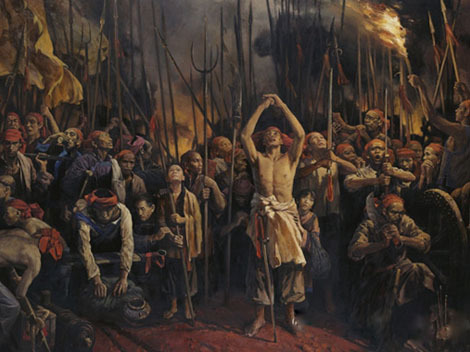The Taiping Rebellion Part II, The Jintian UprisingIn case you missed Part IAfter a decade of preach
The Taiping Rebellion Part II, The Jintian UprisingIn case you missed Part IAfter a decade of preaching and gathering followers, the self proclaimed Chinese brother of Jesus had cobbled together a modest following of 30,000 faithful converts. Headquartered in the town of Jintian, Xiquan preached the destruction of the Qin Dynasty and the creation of a holy Christian kingdom in China. At first Chinese officials ignored the movement. However when Xiquan and his followers began to usurp local governments, the Imperial Government decided that Xiquan and his movement needed to be crushed.In 1851 7,000 Imperial soldiers were sent to Jintian to destroy Xiquan’s movement. Immediately Hong Xiquan organized his followers into a militia complete with officers and military units. While Xiquan’s followers outnumbered the Imperial Army with 20,000 militia soldiers, the soldiers of the Qin Empire were well trained, well organized, and well equipped. Compared to Imperial troops, Xiquan’s army was little more than a disorganized ragtag band of religious fanatics. The Imperial Army quickly surrounded Jiantin, and prepared to assault the town.Xiquan’s rebellion was not the only subversive movement in the region at the time. At the time there were several rebellious groups within China, all who sought to bring an end to the Imperial system in China. Xiquan made alliances with many of these groups. When the Imperial Army attack Jiantin, reinforcements from all over the region flooded to the area, saving Xiquan from defeat. In a series of brilliant surprise attacks and ambushes he halted the Imperial Army’s advance. A second advance was orchestrated, but the Imperial Army was tricked into advancing through a minefield, suffering hundreds of casualties and being forced to halt the attack.Unable to destroy the rebels by immediate force, the Imperial Army settled into a siege, with the intent of starving the movement to death. However, news of Xiquan’s victories spread throughout the Empire. Suddenly from all over China people disgruntled with the Qing rule, mostly lower class peasants, flooded into Southern China to join Xiquan’s movement. The movement quickly grew from a 30,000 followers, to hundreds of thousands, to millions. As the movement grew, so to did it expand, breaking the siege and capturing neighboring towns and cities. By 1853 the rebellion had spread over five provinces, including Guangxi, Jiangxi, Zhejiang, Anhui, and Hebei. Later that year, the rebels captured Nanjing, one of the largest cities in China, which they made their capital. The rebellion became a new state, which Hong Xiquan named, “The Taiping Heavenly Kingdom”. -- source link
Tumblr Blog : peashooter85.tumblr.com
#history#taiping rebellion#jiantin uprising#war#rebellion#china#chinese history#hong xiqaun#19th century
